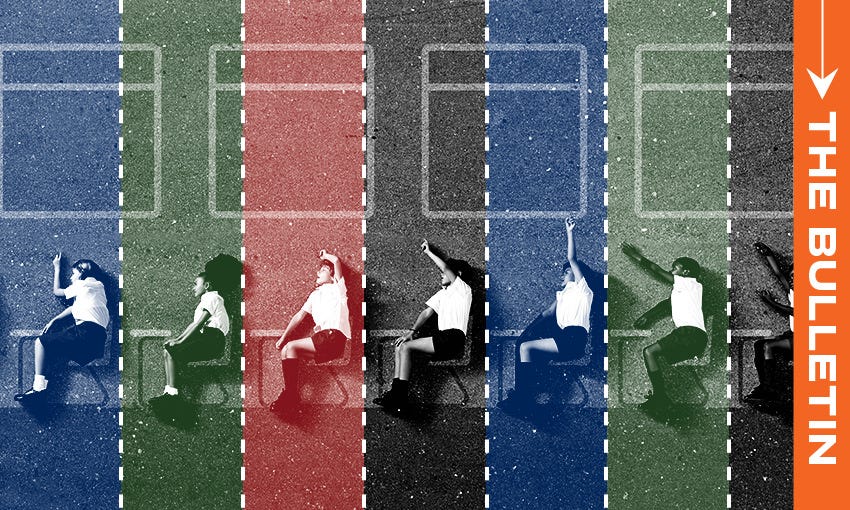The charter school debate rages on
It just received a deluge of opposing submissions, but Seymour’s plan to reintroduce charter schools looks unstoppable.
Mōrena, and welcome to The Bulletin for Thursday, August 1.
In today’s edition: Act in stand-off with parliament’s Speaker over lapel pins; NZ Herald says AI-generated article lacked ‘journalistic rigour’; dozens of roles set to go at GNS. But first, most educators hate them, but charter schools look set to return next year.
Much of education community unites in opposition
The return of charter schools to New Zealand’s educational landscape took another step closer on Monday, when submissions closed on the education bill that will reintroduce the publicly-funded private schools. All but one of the submissions made to the education and workforce committee opposed the bill, notes The Post’s Hanna McCallum (paywalled). The submitters included teachers, principals and other educators, teachers unions and parents. “Their concerns included a lack of research – both nationally and internationally – to show charter schools resulted in overall better education outcomes, the limited ability for teachers to bargain collectively, the lack of transparency required as they would not be subject to OIA requests, the ability to make profit and the lack of requirement to give effect to Te Tiriti o Waitangi.” McCallum adds that a number of submitters “asked MPs if they would feel comfortable sending their children to an unregistered or unqualified doctor, pointing to the lack of requirement for charter schools to employ trained or registered teachers”.
What Seymour is planning
Charter schools were first introduced under the name “partnership schools” in 2014, the result of a National-Act coalition agreement signed in 2011. “By the time the Labour government ended the charter schools scheme in 2018, there were 12 charter schools in operation,” reports The Spinoff’s Shanti Mathias. At one point there were 23 around the country, mostly in Northland and Auckland, with many of them focused on Māori and Pasifika students.
In 2023, charter schools were again included in the National-Act coalition agreement. Associate education minister David Seymour, an enthusiastic charter school supporter, says the government plans to open 50 of the schools, around two-thirds of which would be converted state schools. He hopes to have the first charter schools up and running next year. Expressions of interest for potential school operators close on August 9 and while Seymour won’t reveal how many have been received, the application pack has been downloaded more than 140 times, McCallum reports.
Charter schools: the case for
Submissions on the new bill might have been overwhelmingly opposed, but charter schools have many fans. “Former students of charter schools have described their positive impact, and former charter school principals have praised the flexibility and lack of bureaucratic hurdles involved in running a charter school,” writes Mathias. In 2017, a year before the scheme was disestablished by Labour, then charter school principal Alwyn Poole wrote about what his school did differently: “We have 15 students per class and 60 per ‘Villa’ (mini-school within a school). We run a very hard-working academic morning and an effective arts and activities-based afternoon… We provide all uniforms, stationery and IT. We pay our staff salaries at least 5% above state levels, provide other benefits for them and pay them directly for the development of some resources.”
Announcing $153m in funding for the new version of the schools, Seymour said "the idea that there's a no-holds-barred curriculum is not a fair assessment of what charter schools will be”. The schools will be required to teach a curriculum that is “as good or better than the New Zealand curriculum” and any school that doesn’t measure up will have their funding cut or be shut down, he said.
What the critics say
Opponents, meanwhile, argue that charter schools will do serious damage to the broader educational landscape, Mathias writes. “They say that if you’re worried about educational outcomes, funding for a small number of schools doesn’t lift standards or achievement across the board; even if charter schools succeed, the majority of students will still miss out. Instead, they say, it’s better to increase funding to all schools.”
Opposition parties are highly critical of the new scheme. “Funnelling millions into what is essentially a pet project for David Seymour, at a time when teachers are crying out for more resourcing for our public schools, is morally bankrupt and incredibly irresponsible,” said Green Party education spokesperson Lawrence Xu-Nan. Said Labour’s Jan Tinetti: “There are more examples of charter schools failing their students than there are success stories. The coalition Government is driving to dismantle our public school system and instead promote a privatised, competitive structure that puts profits before kids.”
Show your support, join up today!
"Thank you to The Spinoff team for a balanced news, arts, culture, society, for the (mostly) clear sighted writing and, especially, for the intelligent satire. There needs to be space to be able to laugh" – From a Spinoff member.
If you've appreciated our political satire, as well as our journalism, please consider becoming a member today.
Act in stand-off with Speaker over lapel pins
A fight over the right to display party-branded material in the House saw Act MPs barred from speaking at question time yesterday. With children’s minister Karen Chhour refusing to take off her pin, National’s Louise Upston had to stand in for Chhour to answer on her behalf. As Stuff’s Glenn McConnell explains, “The issue of logos in the House started last week, when National MP James Meager and Act MP Cameron Luxton objected to Te Pāti Māori MP Hana-Rawhiti Maipi-Clarke bringing her laptop into the House with political stickers on it.” The pin-wearing was an act of defiance after Speaker Gerry Brownlee declined to censor Maipi-Clarke. Act leader David Seymour says the protest was about more than just standards in the House. Act MPs allege that a Te Pāti Māori and a Green MP discriminated against Act’s Laura Trask on the basis of her being Pākehā when they voted against her chairing a select committee meeting on the repeal of Section 7AA in the Oranga Tamariki Act. Green MP Kahurangi Carter “denied her objection was anything to do with race. She said Trask just wasn’t experienced enough.”
NZ Herald says AI-generated article lacked ‘journalistic rigour’
The NZ Herald says a recent AI-generated editorial fell short of its standards and it should have applied more “journalistic rigour” to the article before publication. The editorial, about who the All Blacks should choose to play at centre, ran first in the Weekend Herald on 20 July. It also appeared online and in regional papers owned by NZME. The AI use came to light after Hayden Donnell of RNZ’s Mediawatch noticed that “truncated sentences and repetition of key words” in the article suggested it had been produced using a generative AI application like ChatGPT. Mediawatch ran the All Blacks editorial and one below it on MMA fighter Israel Adesanya through AI detection tools “and several returned positive results”. In a statement, NZME editor-in-chief Murray Kirkness said the company uses AI as a tool in its newsrooms, “as indicated in the footer of every article page” and that all AI-generated content should be edited and have “journalistic oversight”. “In this particular case, we accept more journalistic rigour would have been beneficial, and we will communicate this to our team.”
Click and Collect
One in five positions at GNS, the agency responsible for monitoring natural hazards, are set to be disestablished, with 77 roles affected by the cuts
Dunedin City Council has upheld a code of conduct complaint over race-based comments by controversial councillor Lee Vandervis, and demanded he formally apologise or else further actions will be taken.
No, Christchurch’s partly built Te Kaha Stadium isn’t already rusting, says chief executive.
You need to see the picture: ‘Woman calls police after mistaking 'realistic' sex doll for body’
Healthy homes standards worked, writes Max Rashbrooke. The problem is, many landlords are still refusing to comply. Salene Schloffel-Armstrong worries that we’re on the slippery slope towards swimming pool privatisation. Gabi Lardies has some ideas for how to spend your hotly anticipated tax cut. Toby Manhire celebrates a memorable moment in NZ Olympics coverage: Sky TV’s interview with someone who definitely wasn’t swimmer Cameron Gray. Liam Rātana reviews and ranks all the ‘world’s biggest haka’ record attempts. Hera Lindsay Bird picks 10 sports we should cut from the Olympics, and what they should be replaced with.
That’s it for today, thanks for reading.
Let me know in the comments, or get in touch with me at thebulletin@thespinoff.co.nz, if you have any feedback on today’s issue or anything in the news.
If you liked what you read today, share The Bulletin with friends, family and colleagues.















Yet again it is the divisive and outlier ACT Party that is set to roll back the clock on Charter school provisions and yet again when all empirical evidence points to both an unproven record of advantages such schools offer against the outrageous extra funding they recieve when compared to state schools. Luxon represents an emasculated excuse for a Prime Minister. Totally controlled by Seymour and Peters respectively. And as a result Aotearoa is being directed down an extreme RW agenda that few people would have vited for in the election cycle of 2023 but, because of the pathetic nature of MMP, our legislative process has been hijacked by extremist ideologues. It is an extremely worrying state of affairs. Combine this against the backdrop of a main stream media narrative asking us to believe that the Green Party and Te Pati Maori are the dangerous extremists and we have 1984 and 'newspeak' being enacted on an indolent public. Heaven help us all.